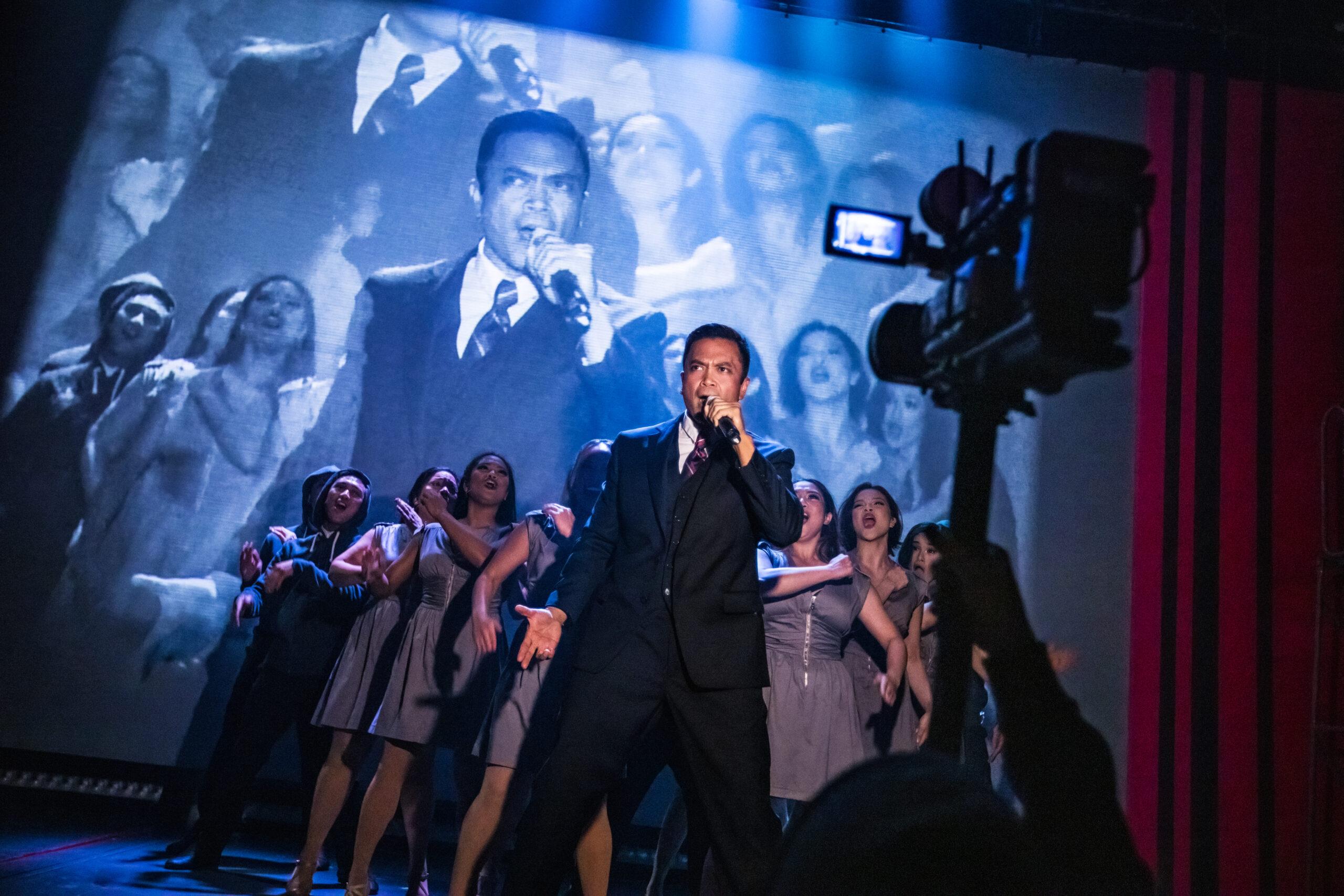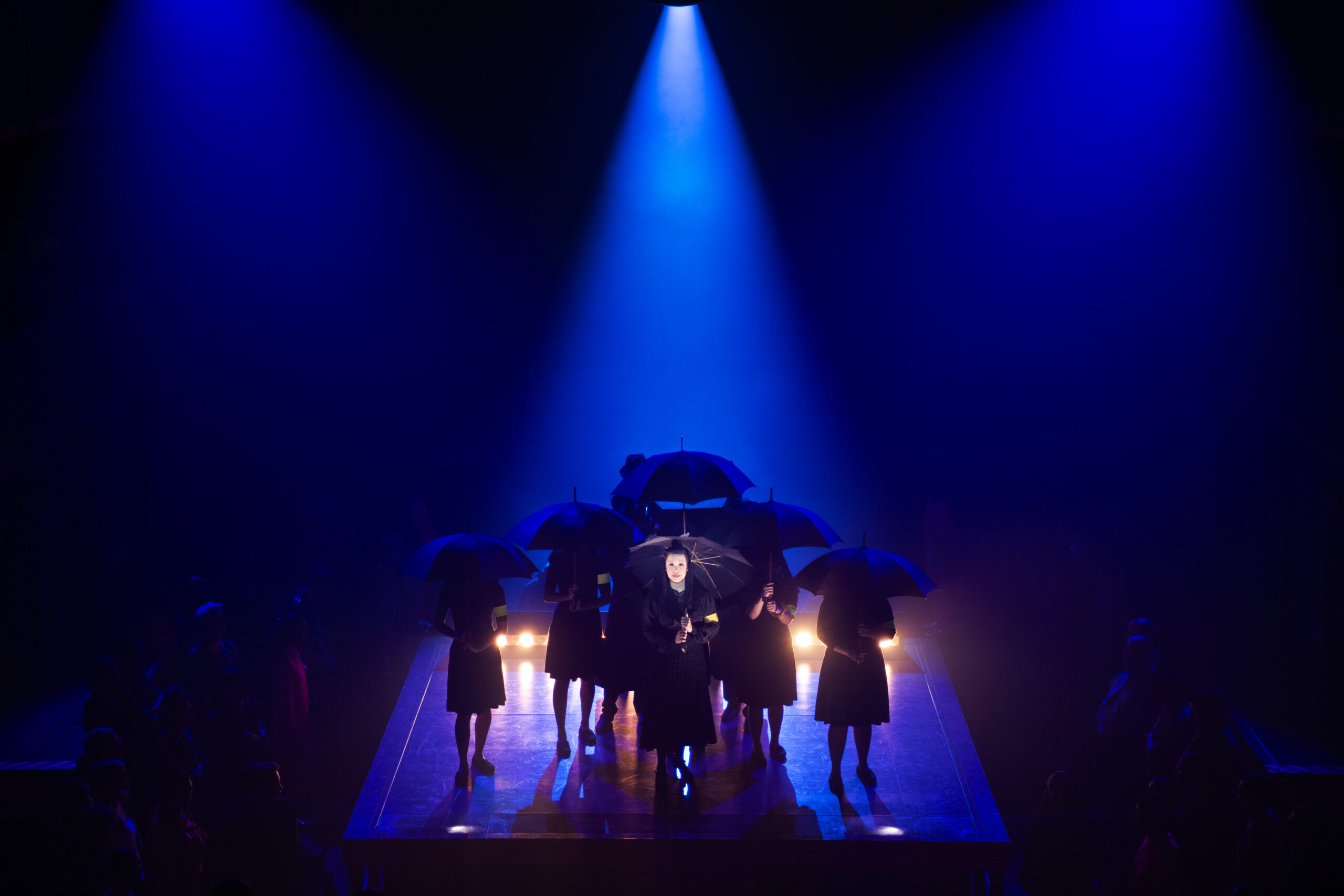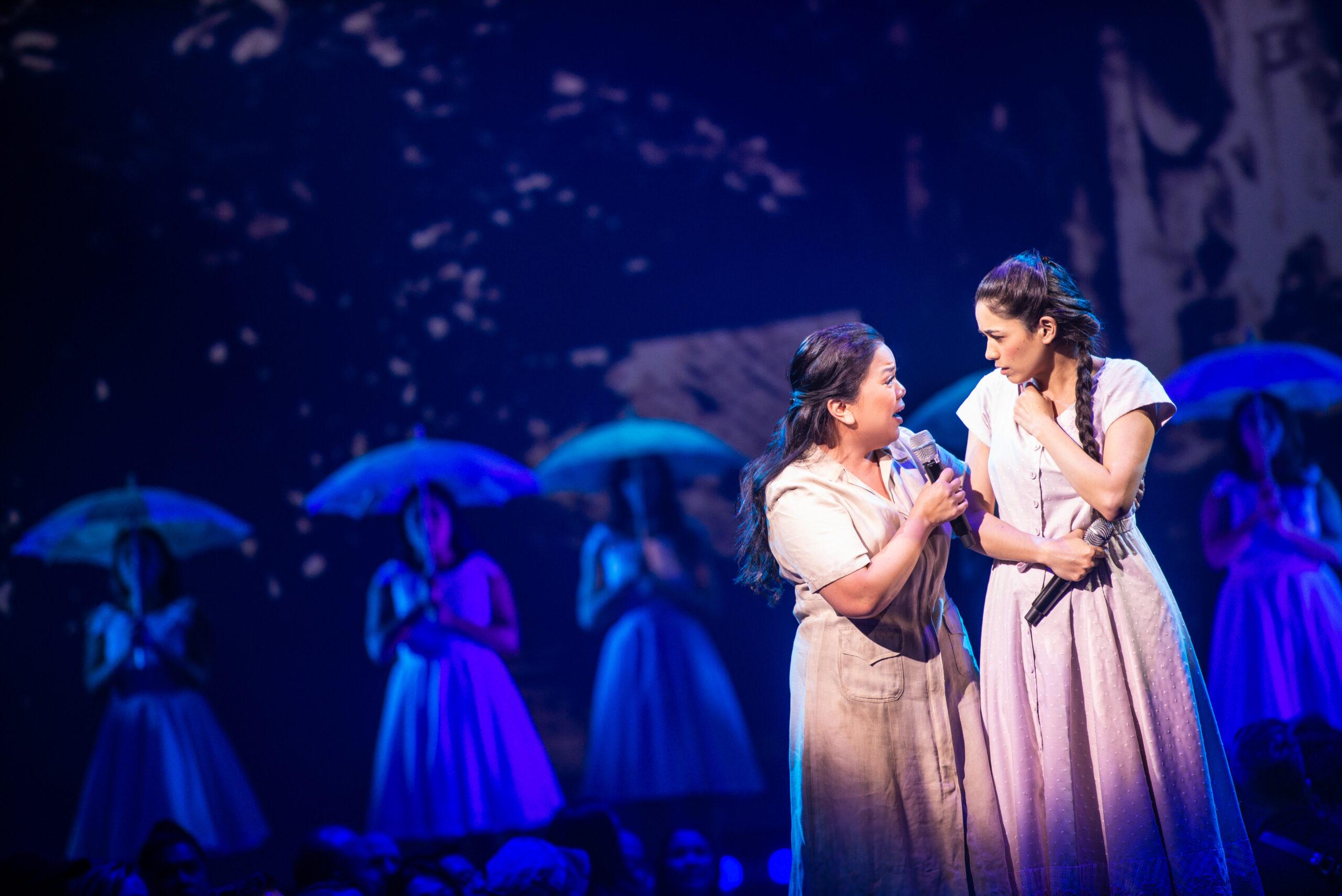
‘Here Lies Love’ stirs emotions, controversy
IN a groundbreaking and historic feat, Broadway is witnessing the rise of “Here Lies Love,” an immersive theater spectacle that boldly shatters boundaries with an all-Filipino cast. With each captivating performance, this musical delves into the complex story of Imelda Marcos, the former First Lady of the Philippines, and the tumultuous events surrounding the 1986 People Power Revolution.
From its powerful portrayals to its innovative immersive format, “Here Lies Love” is not just another Broadway production; it is a trailblazer that proudly embraces Filipino talent and history, making waves and etching its name in the annals of theater history.
With its innovative approach to immersive theater, the show transports spectators into the glitzy world of the 1980s, bringing them face-to-face with historical figures and heart-pounding moments. Led by a stellar all-Filipino cast, including the legendary Lea Salonga, this production has become a milestone in Filipino representation on Broadway and a celebration of a rich cultural heritage.

The show stands as a daring and innovative musical, drawing inspiration from the controversial life of Imelda Marcos, the wife of former Philippine dictator Ferdinand Marcos. While the show possesses moments of brilliance and creativity, it also grapples with a few shortcomings that hinder its overall impact.
David Byrne, the mastermind behind “Here Lies Love,” rightfully marvels at the show’s continued relevance nearly a decade after its off-Broadway premiere. “I had no idea that the politics would be so relevant not just in the Philippines, but all around the world, including this country,” he told AP.
With music by Grammy, Oscar, and Tony Award-winning artists Byrne and Fatboy Slim, this immersive production invites the audience to become part of the show’s captivating narrative.
Under the direction of Tony Award winner Alex Timbers and featuring choreography by Olivier Award nominee Annie-B Parson, “Here Lies Love” transforms the Broadway Theatre into a vibrant dance club where the story of Imelda Marcos unfolds. The audience is given a range of standing and seating options that allow them to experience the performance from various perspectives, from the dance floor to elevated seating areas.
The production’s immersive concept, which envelops the audience in the world of the Marcos regime, is a commendable attempt at engaging theater-goers uniquely and dynamically. Props to set designer David Korins who transformed the orchestra of the Broadway Theater into a discotheque complete with ledges and a giant 42-inch mirror ball. The use of satellite stages, a 360-degree lighting design, and video screens add an interactive dimension that captivates the audience and fosters a sense of connection to the characters’ lives.
However, the musical’s bold take on some of the crucial historical events, while compelling, blurs the lines between fact and fiction. This has left some viewers questioning the accuracy of the purported romantic relationship between Benigno Aquino and Imelda Romualdez as graphics on the screen showed “Imelda’s boyfriend” when Aquino’s character was introduced. This creative license can be divisive, as some audience members may prefer a more historically accurate portrayal, while others appreciate the artistic interpretation.
The cast’s performances are nothing short of extraordinary.

Lea Salonga’s portrayal of Aurora Aquino, the mother of opposition leader Ninoy Aquino, is nothing short of sublime and an absolute show-stopper. Her remarkable vocal prowess and emotive delivery breathe life into the character, leaving a lasting impact on the audience. Salonga’s talent shines brightly, and her presence on stage is truly a high point of the production.
On the evening we watched, the audience exploded the moment Salonga emerged onstage. Kudos to the lighting director (and the moving stage) for creating an appropriately haunting and moving atmosphere.
Although her one-month stint in the production is set to conclude on August 13, the producers have hinted at even more surprises in store, including the possibility of enlisting other eminent stars from the Philippines to offer their unique interpretations of the poignant ballad, “Just Ask the Flowers,” performed by the character Dona Aurora Aquino at her son’s funeral.

Among the many unforgettable moments in the show, one particular scene stands out, signaling the start of the Marcoses’ fall from power. As Arielle Jacobs retakes the spotlight, belting out “Why Don’t You Love Me” from the elevated mezzanine level, the rest of the cast led by Salonga gathers below, flashing the iconic Laban sign—a powerful visual representation of resistance and unity.
This back-to-back juxtaposition of performances amplifies the impact of the narrative and further solidifies the show’s immersive nature, delivering a powerful one-two punch.
Jacobs, in the role of Imelda Marcos, definitely gives her all, leaving a lasting impact with her powerful vocals and emotional delivery. The start of the musical traced Imelda’s humble beginnings as a barrio lass who slowly evolved into a resolute and formidable figure – a steel butterfly if you will, as the show progressed. She was captivating in both.
Her crisp delivery of “Put*ng ina mo!” while degrading her husband’s genital size made Filipinos in the house roar as she sang “It takes a woman to do a man’s job” when she found out about his affair with American actress Dovie Beams.

The performances by Conrad Ricamora, Jose Llana, and Melody Butiu, who are part of the original cast at The Public Theater from a decade ago, showcase growth and maturity in their nuanced performances. Ricamora and Butiu reprised these roles at the Seattle Repertory in 2017, with Filipino singer Mark Bautista stepping in as Ferdinand.

Having had the privilege of witnessing their earlier portrayals, I didn’t think they could top their performances back then. However, the passage of time and the wealth of experiences gathered over the last decade seem to have breathed new life into their characters, rendering them more vivid and compelling than ever before.
Llana’s depiction of his role exuded a newfound sternness and a palpable sense of menace, particularly evident in the first half of the production. As the ailing despot, he masterfully embodied the essence of a once-powerful figure whose prime years have now waned. His rendition of “Perfect Hand” hit all the right notes, resonating with precision and conviction.

Ricamora, on the other hand, delivered a bouncy rendition of “Child of the Philippines,” pouring his soul into the fast-paced number. Despite its rapid tempo, his emotive performance left a lasting impact.
The costumes, designed by Tony Award-winner Clint Ramos, are a visual feast.
The lavish and intricate outfits, especially those worn by Imelda Marcos, successfully transport the audience to the glamour and opulence of the era. Ramos’ attention to detail is praiseworthy, and his contribution significantly enhances the overall visual appeal of the musical as he masterfully showcased the former First Lady’s glamorous terno dresses and humble dasters from her early days in Tacloban.
The dichotomy between Ferdinand Marcos and Ninoy Aquino is subtly portrayed through their distinct costumes, with the dictator dressed in black and the opposition senator garbed in white.

Matthew Murphy and Evan Zimmerman (2023)
The show’s immersive nature means the audience members are always in the thick of the action, as they witness the drama unfold around them. Whether seated ring-side, in the front or rear mezzanine, or dancing among the 300 people on the main level, every spectator is engaged and becomes part of the story.
And this is where experiencing FOMO comes in.
Audience members find themselves torn between the excitement of the dancefloor and the curiosity about the view from the mezzanine. Those dancing on the main level can’t help but wonder if they are missing out on a different perspective, while those watching from the mezzanine can’t help but envy the infectious energy and fun happening on the dancefloor. The show’s unique format leaves viewers pondering which vantage point offers the bigger picture of this groundbreaking production.
Before the resident DJ Moises Villarama sang “God Draws Straight” with the rest of the cast, he talked briefly about history repeating itself, telling the audience that Ferdinand Marcos, Jr. was elected as the president last year. There were scattered boos and hisses in the theater and it was broken by a solitary scream of a woman who said, “He’s my president!”
As the applause continues to echo in the theater, “Here Lies Love” stands as a powerful testament to the talent, passion, and creativity of its cast and creators.
However, amidst the praise and accolades, a heated debate ensues about the show’s portrayal of Imelda Marcos and the controversial history of the Marcos dictatorship.
In a CBS interview, Elaine Quijano asked, “Some people think that in 2023, there should not be this kind of show devoted to a figure Imelda Marcos, what’s your response to that?’
“Oh goodness, gracious. It’s great for audiences to look at it and learn from it because it’s still happening in other parts of the world. Our offering is, it’s happened to us but this is what happened in the end. Basically, it’s a story about how a people regained the power for themselves and it’s kind of an inspirational thing to think about if you look at it that way,” Salonga replied.
Some critics argue that the production may unintentionally glorify Imelda and romanticize the heinous acts committed during their oppressive rule. They claim that the show, created by a white man, offers a sanitized version of the dictatorship’s history, attempting to humanize a figure known for corruption and violence.
These critics question whether the show trivializes the crimes committed by the Marcoses and overlooks the suffering they inflicted upon countless Filipinos. They worry that the artistic interpretation may inadvertently erase the painful realities endured by the victims of the regime. It raises the question of whether the pursuit of art and entertainment should come at the expense of historical accuracy and sensitivity.
On the other hand, the producers firmly assert that “Here Lies Love” is far from glorifying the Marcoses; instead, they argue that the show takes a firm stance against their actions and serves as a reminder of the dark chapter in Philippine history. They contend that the immersive experience allows audiences to connect emotionally with the narrative, evoking empathy and understanding of the consequences of dictatorship.
The show has added an insert to the Playbill showing a historical overview from the time the United States colonized the Philippines in 1898 to the People Power Revolution in 1986 when the Marcoses were airlifted out of the country by U.S. Marines.
As the controversy rages on, the show continues to make waves, breaking boundaries with its all-Filipino cast and confronting the complexities of history head-on. The production’s impact is undeniable, sparking essential conversations about the intersection of art, history, and the responsibility of storytelling.
Ultimately, we believe it is up to each audience member to grapple with the layers of meaning in the show and draw their conclusions. As theatergoers leave the performance, they carry with them not only a powerful theatrical experience but also profound questions about the portrayal of history on stage.
The ongoing debate surrounding its portrayal of Imelda and the dark era of the Marcos dictatorship highlights the significance of presenting history responsibly while delving into the complexities of human nature.
“Here Lies Love” is doing its part, serving as a poignant reminder that theater has the unique capacity to ignite conversations, challenge perceptions, and keep the collective memory of a nation alive. As the curtains fall on this groundbreaking production, its echoes will linger, urging us all to confront the past and reflect on the present.
It is an audacious and imaginative musical that fearlessly delves into the controversial life of Imelda Marcos. Its immersive concept and innovative staging elevate the theatrical experience, allowing the audience to be part of the historical narrative.
Salonga’s exceptional performance, along with the stunning costume design, contribute to the musical’s high points making the show a commendable and bold effort to bring an important chapter of Philippine history to the Broadway stage.






